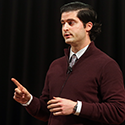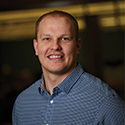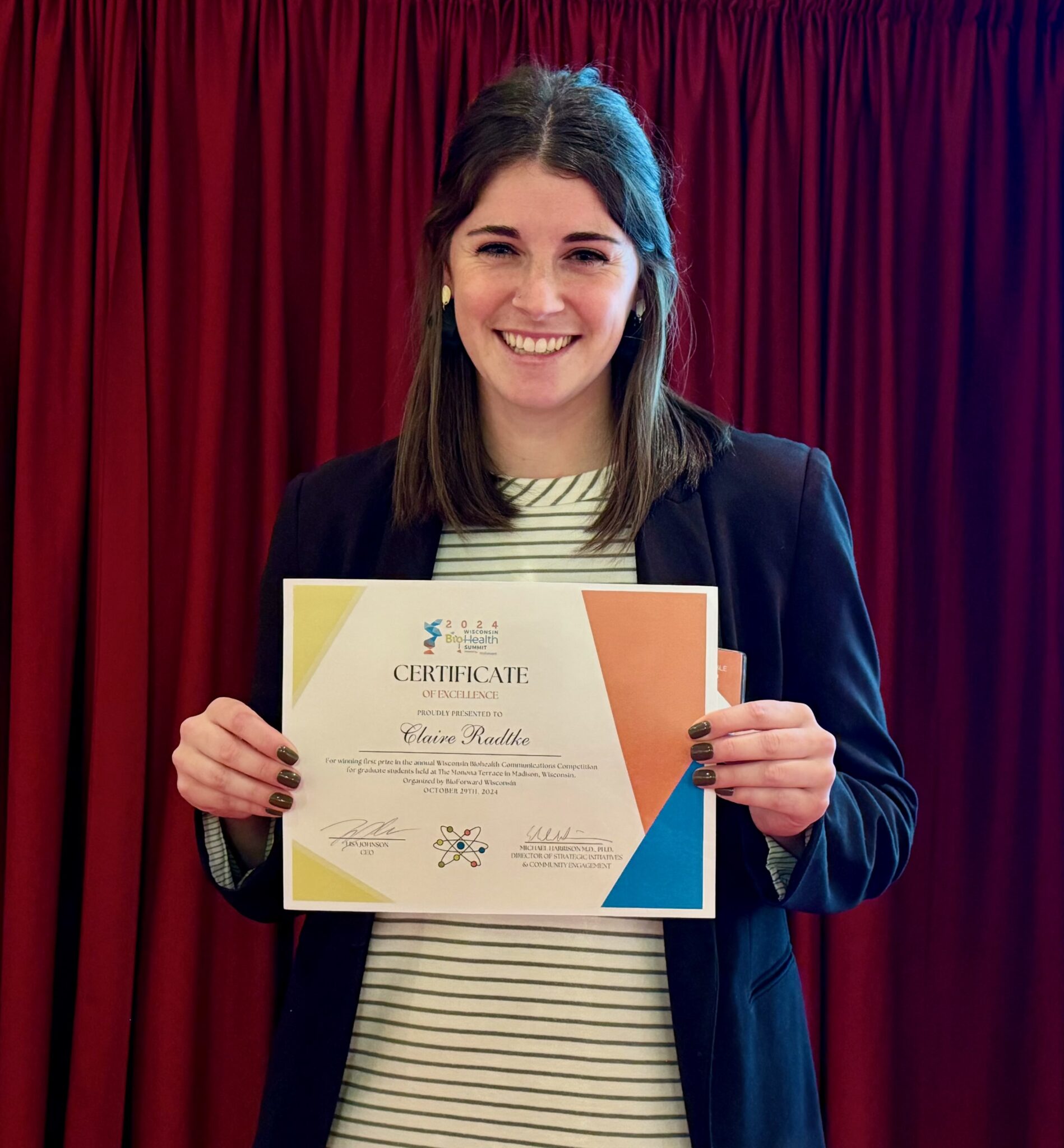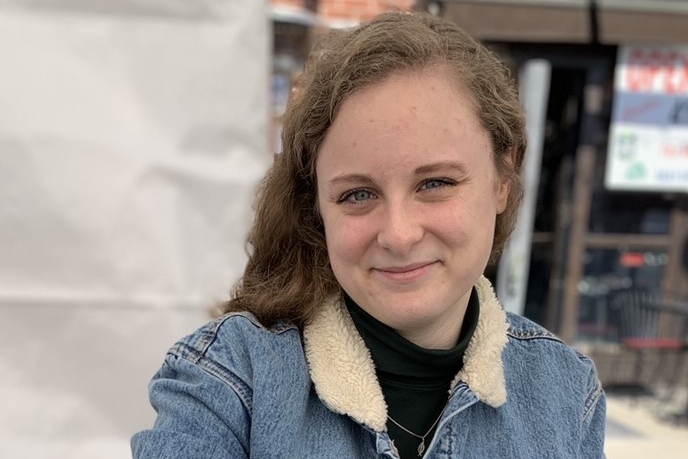Nicole Wells- MSN Nursing
 Post-Graduation Job Success!
Post-Graduation Job Success!
Nicole will be starting as a Registered Nurse at St. Luke's Emergency Department in July 2020 and graduating with her MSN in August 2020.
 2019- Giovanni is a PhD candidate in the Clinical and Translational Rehabilitation Health Science program. He attended the American Physical Therapy Association 2019 Combined Sections Meeting (Jan 23-26) with support of the Graduate Student Research Travel Award.
2019- Giovanni is a PhD candidate in the Clinical and Translational Rehabilitation Health Science program. He attended the American Physical Therapy Association 2019 Combined Sections Meeting (Jan 23-26) with support of the Graduate Student Research Travel Award.
Berardi was selected to perform a platform presentation on his work detailing the pain and fatigue response during exercise recovery in people with fibromyalgia at the Marilyn Gossman Graduate Student Research Seminar. This seminar highlights the professions developing researchers.
Previous work: Giovanni Berardi attended the World Congress on Pain (hosted by the International Association for the Study of Pain) in Boston, Massachusetts on 09/12/2018 to 09/16/2018. Berardi performed a poster presentation of his work detailing the change in pain modulation with isometric and dynamic resistance exercise in people with fibromyalgia. He was also selected to partake in the Pain Research Forum Correspondents program, which is a science communications training program that provides knowledge and skills needed to communicate science effectively to a wide range of pain researchers and to patients and the broader public.
Earlier in 2018, Giovanni was awarded a Promotion of Doctoral Studies (PODS) Scholarship by the Foundation for Physical Therapy. More specifically, he is a recipient of the Bella May Award, funded by the Bella J. May Scholarship Fund. This award is peer reviewed process by the Foundation for Physical Therapy.
Berardi also the winner of the 2018 of the Three Minute Thesis Competition for his research on Resisting the Pain Epidemic: Pumping Up Pain Relief.
 Christopher Sundberg graduated from the Clinical and Translational Rehabilitation Health Sciences PhD program (now known as Exercise and Rehabilitation Science) in May of 2018 under the mentorship of Dr. Sandra Hunter and immediately following graduation began his postdoctoral training with Dr. Robert Fitts in the Department of Biological Sciences. He was recently awarded a 2 year postdoctoral fellowship from the American Heart Association (totaling $103,328) to support his research project, entitled Mechanisms of fatigue in older adults: Role of vascular function and bioenergetics. The primary aim of this project is to identify the causes for the increased fatigue that older adults experience when performing dynamic exercises. The central hypothesis is that the increased fatigue in older adults is due to a greater accumulation of metabolic by-products within the muscle as a result of the combined effects of 1) impaired skeletal muscle bioenergetics and 2) vascular dysfunction. The long-term goal of the project is to generate an in-depth understanding of the fatigue process that can be used to develop targeted therapeutic interventions to improve exercise intolerance, physical function, and overall health in the aging population.
Christopher Sundberg graduated from the Clinical and Translational Rehabilitation Health Sciences PhD program (now known as Exercise and Rehabilitation Science) in May of 2018 under the mentorship of Dr. Sandra Hunter and immediately following graduation began his postdoctoral training with Dr. Robert Fitts in the Department of Biological Sciences. He was recently awarded a 2 year postdoctoral fellowship from the American Heart Association (totaling $103,328) to support his research project, entitled Mechanisms of fatigue in older adults: Role of vascular function and bioenergetics. The primary aim of this project is to identify the causes for the increased fatigue that older adults experience when performing dynamic exercises. The central hypothesis is that the increased fatigue in older adults is due to a greater accumulation of metabolic by-products within the muscle as a result of the combined effects of 1) impaired skeletal muscle bioenergetics and 2) vascular dysfunction. The long-term goal of the project is to generate an in-depth understanding of the fatigue process that can be used to develop targeted therapeutic interventions to improve exercise intolerance, physical function, and overall health in the aging population.
Theresa Hardy- Nursing PhD
 Following graduation, Theresa Hardy from Marquette's PhD program in nursing accepted a postdoctoral training position in epigenetics research at New York University.
Following graduation, Theresa Hardy from Marquette's PhD program in nursing accepted a postdoctoral training position in epigenetics research at New York University.
During her fifth year in the Nursing PhD program, Hardy attended the Sigma Theta Tau conference in Dublin, Ireland to partake in a poster presentation session. Hardy's presentation about her research, entitled Biobehavioral predictors of anti-Müllerian hormone: A Systematic Review, examines a biomarker of ovarian function called anti-Müllerian hormone. Hardy worked to increase the understanding of the hormone in the general population so that it can be used to more accurately reassess reproductive potential. Her research examines the biological and behavioral factors that affect the hormone's concentration so intervention can be made to prevent a premature decline in ovarian function and fertility lifespan. Hardy will completed her PhD in May of 2018, and plans to start a postdoctoral fellowship afterwards. Her fellowship will be funded by the National Institute of Nursing Research.
 Lauren Sara, a second year Clinical Translational Rehabilitation Health Science doctoral student was awarded a Promotion of Doctoral Studies (PODS) Scholarship from the American Physical Therapy Assocation. This award recognizes "the most highly qualified doctoral students and post-doctoral fellows preparing for research careers." These scholarships were developed in an effort to prepare clinicians for a career in research and ultimately one that will contribute to evidence-based physical therapist practice. Lauren received this award for the second year in a row.
Lauren Sara, a second year Clinical Translational Rehabilitation Health Science doctoral student was awarded a Promotion of Doctoral Studies (PODS) Scholarship from the American Physical Therapy Assocation. This award recognizes "the most highly qualified doctoral students and post-doctoral fellows preparing for research careers." These scholarships were developed in an effort to prepare clinicians for a career in research and ultimately one that will contribute to evidence-based physical therapist practice. Lauren received this award for the second year in a row.
 David Defilippis had a secure diesel mechanic job with good pay and benefits in his mid-20's before he made the bold decision to leave to study biology and pursue his doctorate with Marquette's Department of Biological Sciences. This spring, he was awarded a three-year, $144,000 National Science Foundation Graduate Research Fellowship. Read about his Long Road to Ecology journey to success here.
David Defilippis had a secure diesel mechanic job with good pay and benefits in his mid-20's before he made the bold decision to leave to study biology and pursue his doctorate with Marquette's Department of Biological Sciences. This spring, he was awarded a three-year, $144,000 National Science Foundation Graduate Research Fellowship. Read about his Long Road to Ecology journey to success here.
Sergio Estrada Villegas, a PhD candidate in the Biological Sciences Department, recently traveled to Merida, Yucatan, Mexico to attend a conference for the Association for Tropical Biology and Conservation and give an oral presentation about his research. His research, entitled Dynamics of biomass accretion in the absence of competition in tropical successional forests, discussed the competition between plants in areas of the tropics that are being deforested and are quickly regeneration into early successional forests. These types of forests have the capacity to transform large quantities of atmospheric carbon dioxide into wood, but no one had considered how plants and trees may affect the speed at which early successional forests transform carbon dioxide into wood. Estrada Villegas and his fellow researchers provided evidence that lianas (woody vines) slow down tree growth and decrease the capacity of early successional forests to accumulate biomass (wood). Their results show the role of lianas in successional forests might be more detrimental than previously predicted. Once done with his doctoral degree program, Estrada Villegas hopes to work in academia or in NGOs and continue studying how tropical successional forests may help curb climate change and protect biodiversity.
Doug Lyke, a fourth year PhD candidate in the Biological Sciences Department, recently traveled to Newry, ME to attend the Gordon Research Conference and participate in a poster presentation session. His presentation, entitled Actin and the Sequestration of Protein Aggregates, looked at the involvement of the cellular cytoskeleton and movement of protein aggregates. Many neurodegenerative diseases are the products of protein aggregation, and Lyke and his fellow researchers believe understanding the dynamics of cellular components to manage them is crucial in being able to efficiently understand, treat, and prevent these diseases. After receiving his doctoral degree, Lyke would like to pursue a career as a scientist in the industry or biotech field.
 Third year Biological Sciences doctoral student, Katherine Maniates, plans to travel to University of California, Los Angeles for the 21st Annual C. Elegans Conference sponsored by Genetics Society of America. At this conference, Maniates will give a poster presentation on her research, entitled The miR-44 family of microRNAs are essential for normal fertility in C. elegans. MicroRNAs as a set of regulators are essential for both development and physiology, however little is understood about the functions of individual microRNAs. Maniates's research looks into one group of microRANs, the miR-44 family and has identified that these microRNAs are important for normal fertility in C. elegans. After completing her doctoral program, Maniates plans to pursue post-doctoral research, and eventually a career in the academic setting.
Third year Biological Sciences doctoral student, Katherine Maniates, plans to travel to University of California, Los Angeles for the 21st Annual C. Elegans Conference sponsored by Genetics Society of America. At this conference, Maniates will give a poster presentation on her research, entitled The miR-44 family of microRNAs are essential for normal fertility in C. elegans. MicroRNAs as a set of regulators are essential for both development and physiology, however little is understood about the functions of individual microRNAs. Maniates's research looks into one group of microRANs, the miR-44 family and has identified that these microRNAs are important for normal fertility in C. elegans. After completing her doctoral program, Maniates plans to pursue post-doctoral research, and eventually a career in the academic setting.
 Biological Sciences fifth year doctoral student, Meghan Fealey, traveled to Los Angeles, CA for the 21st Annual C. Elegans Conference sponsored by Genetics Society of America at the University of California, Los Angeles. At this conference, Fealey gave an oral presentation on her abstract during the Gene Stability, Gene Expression and Technologies parallel session. Her presentation, entitled Developmental regulation of H3K9me2 and chromatin compaction by C. elegans synMuy B proteins, focused on how DNA organization and compaction is achieved and what proteins within the cell are important for this. Fealey's research determines that a group of tumor suppressor proteins organize DNA and ensure that the surrounding genes are repressed, which gives insight to gene regulation and helps researchers understand cancer biology more thoroughly. In her future plans, Fealey hopes to continue her research through a post-doctoral research position, and eventually move on to teach and conduct further research at a university.
Biological Sciences fifth year doctoral student, Meghan Fealey, traveled to Los Angeles, CA for the 21st Annual C. Elegans Conference sponsored by Genetics Society of America at the University of California, Los Angeles. At this conference, Fealey gave an oral presentation on her abstract during the Gene Stability, Gene Expression and Technologies parallel session. Her presentation, entitled Developmental regulation of H3K9me2 and chromatin compaction by C. elegans synMuy B proteins, focused on how DNA organization and compaction is achieved and what proteins within the cell are important for this. Fealey's research determines that a group of tumor suppressor proteins organize DNA and ensure that the surrounding genes are repressed, which gives insight to gene regulation and helps researchers understand cancer biology more thoroughly. In her future plans, Fealey hopes to continue her research through a post-doctoral research position, and eventually move on to teach and conduct further research at a university.
 Congratulations to current Master of Science in Nursing student, Monique Tarrant, for receiving the 2016 Milwaukee Black Nurses Association (MBNA) Graduate Scholarship! The mission of the MBNA is to support, empower, and educate nurses of color around the Milwaukee area, and Ms. Tarrant continues to live by this mission through her work.
Congratulations to current Master of Science in Nursing student, Monique Tarrant, for receiving the 2016 Milwaukee Black Nurses Association (MBNA) Graduate Scholarship! The mission of the MBNA is to support, empower, and educate nurses of color around the Milwaukee area, and Ms. Tarrant continues to live by this mission through her work.
 Maja Whitaker, a second year graduate student studying speech-language pathology with a Bilingual English-Spanish specialization, recently attended a conference in Philadelphia, PA sponsored by the American Speech-Language-Hearing Association. At this conference, Whitaker presented a poster, entitled Vowels Acoustics in English-Accented Spanish, which demonstrated the qualitative research she has done in her field regarding this area. In her research, Whitaker examined that English-Accented Spanish speakers may show greater variability in individual vowels compared to native Spanish speakers. Whitaker, who recently received the American Speech-Language-Hearing Foundation Graduate Student Scholarship, plans to either work as a speech-language pathologist with elementary-aged students or in a medical setting with adult patients upon receiving her Masters of Science.
Maja Whitaker, a second year graduate student studying speech-language pathology with a Bilingual English-Spanish specialization, recently attended a conference in Philadelphia, PA sponsored by the American Speech-Language-Hearing Association. At this conference, Whitaker presented a poster, entitled Vowels Acoustics in English-Accented Spanish, which demonstrated the qualitative research she has done in her field regarding this area. In her research, Whitaker examined that English-Accented Spanish speakers may show greater variability in individual vowels compared to native Spanish speakers. Whitaker, who recently received the American Speech-Language-Hearing Foundation Graduate Student Scholarship, plans to either work as a speech-language pathologist with elementary-aged students or in a medical setting with adult patients upon receiving her Masters of Science.
Miguel Sotelo, a second year doctoral student, recently traveled to Minneapolis to give a presentation on his research, entitled Methods for Whole-Brain Probabilistic Tractography in Acute and Chronic Stroke Survivors. In his presentation, Sotelo explained the methods he implemented to use a probabilistic model of brain connectivity with information of local fiber orientation, and the results the research yielded. Sotelo plans to receive his PhD in Functional Imaging, and eventually teach at the university level.
Brice Cleland, a graduate student in the Clinical and Translational Rehabilitation Health Science program, recently attended the Society of Neuroscience Conference in San Diego, California. At the conference, Brice presented his research on whether the affected limb in stroke survivors retains motor abilities during pedaling.
Previously in his third year Cleland presented at the Society of Neuroscience conference in Chicago, IL this fall. His presentation, entitled Reducing pedaling-related brain activation volume post-stroke does not depend on task performance, investigates factors that contribute to movement-related brain activation in stroke survivors. A recent study demonstrated that stroke survivors have decreased brain activation compared to controls during a pedaling task. This change in brain activation may result from changes in the structure or function of the brain or changes in the way that movements are performed. The factors causing changes in brain activation post-stroke are important because they potentially can be manipulated to improve brain activation and movement. When Brice graduates from Marquette, he plans to work as a researcher and professor at a university.
Evan Hess, a third year graduate student at Marquette University in the neuroscience program, was featured in the influential Fall 2016 issue of the Society for Neuroscience quarterly newsletter. In his research, Hess found that astrocytes are a key component in compulsive behaviors.
Brian Pattengale, a third-year PhD student studying Chemistry, presented his research on the application of ZIF-67 to Photocatalytic Hydrogen Evolution at the Gordon Research Conferences at Salve Regina University in Rhode Island. His research aims to fundamentally understand the transient photodynamic catalytic events that underlie solar fuel conversion reactions. After earning his degree, Brian plans to pursue research and continue a postdoctoral position.
This summer, graduate students in the Biological Sciences program participated in a research 'elevator talk' competition. The science conducted in their research labs can be complicated, so the studentsthe students used these elevator talks to break down their research projects into 60 second, easy to understand presentations. Summer research students, which included undergraduates from Marquette University and other institutions, served as judges. Videos of the elevator talks can be viewed online.
 The Nurses Foundation of Wisconsin recently announced that Laurie Kunkel-Jordan, a current Marquette University PhD student in nursing, is the winner of the 2016 Research Grant. Laurie's research explores newly graduated nurses and preceptorship. You can read more about Laurie's research on the Wisconsin Nurses Association website.
The Nurses Foundation of Wisconsin recently announced that Laurie Kunkel-Jordan, a current Marquette University PhD student in nursing, is the winner of the 2016 Research Grant. Laurie's research explores newly graduated nurses and preceptorship. You can read more about Laurie's research on the Wisconsin Nurses Association website.
 Doug Lyke is currently a third year PhD student in the Biological Sciences department and had the honor of presenting a poster at the Allied Genetics Conference in Orlando, FL this July. Doug's posted was entitled Early Stage Prion Formation and the Insoluble Protein Deposit (IPOD) and his research looks at proteins that are directly related to neurodegenerative diseases in the model organism yeast. Specifically, Doug's work focuses on the cellular pathways by which these proteins enter their diseased conformation. The significance of this work is that it will hopefully uncover details of the pathways that these different diseases such as Alzheimer's or Parkinson's take in their early development stages, and then this information could be applied to developing better treatment options in human health. In the future, Doug hopes to use his degree to work as a scientist in the biotech industry. Doug was also awarded the Summer 2016 Jobling Travel Award.
Doug Lyke is currently a third year PhD student in the Biological Sciences department and had the honor of presenting a poster at the Allied Genetics Conference in Orlando, FL this July. Doug's posted was entitled Early Stage Prion Formation and the Insoluble Protein Deposit (IPOD) and his research looks at proteins that are directly related to neurodegenerative diseases in the model organism yeast. Specifically, Doug's work focuses on the cellular pathways by which these proteins enter their diseased conformation. The significance of this work is that it will hopefully uncover details of the pathways that these different diseases such as Alzheimer's or Parkinson's take in their early development stages, and then this information could be applied to developing better treatment options in human health. In the future, Doug hopes to use his degree to work as a scientist in the biotech industry. Doug was also awarded the Summer 2016 Jobling Travel Award.
 Amanda Baum, fifth year Chemistry PhD student, presented at the Bioinorganic Chemistry (Gordon Research Seminar) Conference in Ventura, California in January. Her presentation on Biologically Relevant Fe(II) Complexes Containing Redox Active (Hydro)quinone Ligands focuses on the preparation and characterization of synthetic metal complexes that mimic the structure and/or function of iron-containing enzymes in nature. These efforts combine inorganic synthesis, spectroscopic methods, and reactivity studies. Her research group expects that studies of the synthetic models will provide insights into the function of the biological enzymes and also reveal new and interesting chemistry.
Amanda Baum, fifth year Chemistry PhD student, presented at the Bioinorganic Chemistry (Gordon Research Seminar) Conference in Ventura, California in January. Her presentation on Biologically Relevant Fe(II) Complexes Containing Redox Active (Hydro)quinone Ligands focuses on the preparation and characterization of synthetic metal complexes that mimic the structure and/or function of iron-containing enzymes in nature. These efforts combine inorganic synthesis, spectroscopic methods, and reactivity studies. Her research group expects that studies of the synthetic models will provide insights into the function of the biological enzymes and also reveal new and interesting chemistry.
Maria Bengtson, Biomedical Engineering PhD student, won the Pierce Prize Competition last week at January Dissertation Boot Camp. She gave a two-minute presentation on her rehabilitation engineering research for her dissertation, and her peers voted her presentation as the most clear, concise, and compelling of the 17 competitors. The Pierce Prize Competition is a friendly competition on the last day of Dissertation Boot Camp that honors Mr. Craig Pierce, who retired from his position as the Assistant Dean of the Marquette University Graduate School in May 2015 after serving the Graduate School for 17 years and starting our first Dissertation Boot Camp 10 years ago.




 Claire Radtke - Biological Sciences, Ph.D.
Claire Radtke - Biological Sciences, Ph.D. Kristen Quaglia - Biological Sciences
Kristen Quaglia - Biological Sciences Nicholas Langer is a current doctoral student in the Department of Chemistry who was recently awarded the Richard W. Jobling Distinguished Research Assistantship. The award is made possible through a generous donation to Marquette University to encourage and support research activity by doctoral students in the fields of science and engineering.
Nicholas Langer is a current doctoral student in the Department of Chemistry who was recently awarded the Richard W. Jobling Distinguished Research Assistantship. The award is made possible through a generous donation to Marquette University to encourage and support research activity by doctoral students in the fields of science and engineering. adison Sutton - Biological Sciences, Ph.D.
adison Sutton - Biological Sciences, Ph.D.
 Carolin Joy - Chemistry Ph.D.
Carolin Joy - Chemistry Ph.D. Post-Graduation Job Success!
Post-Graduation Job Success! 
 Christopher Sundberg graduated from the
Christopher Sundberg graduated from the 
 Lauren Sara, a second year
Lauren Sara, a second year  David Defilippis
David Defilippis Third year Biological Sciences doctoral student,
Third year Biological Sciences doctoral student, Biological Sciences fifth year doctoral student,
Biological Sciences fifth year doctoral student, Congratulations to current Master of Science in Nursing student,
Congratulations to current Master of Science in Nursing student, Maja Whitaker, a second year graduate student studying speech-language pathology with a Bilingual English-Spanish specialization, recently attended a conference in Philadelphia, PA sponsored by the
Maja Whitaker, a second year graduate student studying speech-language pathology with a Bilingual English-Spanish specialization, recently attended a conference in Philadelphia, PA sponsored by the The Nurses Foundation of Wisconsin recently announced that
The Nurses Foundation of Wisconsin recently announced that Doug Lyke
Doug Lyke Amanda Baum, fifth year Chemistry PhD student, presented at the Bioinorganic Chemistry (Gordon Research Seminar) Conference in Ventura, California in January. Her presentation on
Amanda Baum, fifth year Chemistry PhD student, presented at the Bioinorganic Chemistry (Gordon Research Seminar) Conference in Ventura, California in January. Her presentation on